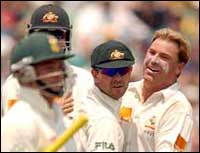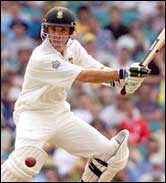South Africa fight back after first innings disintegration
Daniel Laidlaw
Gary Kirsten and Boeta Dippenaar led a second innings fightback after South
Africa collapsed in the first innings and were forced to follow on on day
three of the third Test.
South Africa were battling for respectability at 209/2 in the second innings
after a disastrous first session which saw the tourists bowled out for 154
and follow on 400 runs behind. McGrath, Warne, and MacGill all bowled
superbly to finish with three wickets each but encountered sterner
opposition in the second innings, with Kirsten (82 not out) and Dippenaar
(74) involved in a 149-run partnership for the second wicket after the early
loss of Gibbs.
Although still in position to win by an innings, Australia created the
possibility of having to bat last to win, with South Africa 191 behind and
two days remaining.
 When South Africa needed 262 to avoid the follow-on at the start of play,
there was speculation the match could be over by the end of the day. That
distant prospect came more sharply into focus after Shane Warne bowled Neil
McKenzie just three balls into the morning session.
When South Africa needed 262 to avoid the follow-on at the start of play,
there was speculation the match could be over by the end of the day. That
distant prospect came more sharply into focus after Shane Warne bowled Neil
McKenzie just three balls into the morning session.
The genesis of the dismissal was the previous day, when McKenzie played
inside the line of some deliveries without attempting to cover his stumps,
relying on the ball to spin past off. Without addition to the overnight
score, McKenzie pushed forward, Cullinan-like, with bat tucked behind pad,
and the marginal turn beat the bat to crash into the stumps. It signalled
the recommencement of South Africa's disintegration.
Warne claimed two in his first two overs when he trapped Justin Ontong lbw
for 9, leaving South Africa 98/6. Ontong had begun in a positive vein,
hooking McGrath and chasing a wide ball from Warne, until pushed onto the
back foot by the leg-spinner. The straight, flatter ball hurried onto
Ontong, in line with leg stump, and umpire Shepherd had no doubt.
McGrath had begun the day in tandem with Warne and collected his third
wicket of the innings when skipper Shaun Pollock somewhat desperately sliced
a catch to backward point after little more than half an hour. Pollock drove
ambitiously on the up to the ball wide of off, finding Martyn square of the
wicket for 6; South Africa reduced to 111/7.
Nicky Boje was next, the fourth wicket of the morning to fall less than 45
minutes into the day. It was a calamitous run out, just the kind of
dismissal that happens to a side when they are 121/7 and more than 400 runs
behind. Boje turned McGrath out to mid wicket and Justin Langer chased from
short leg, collecting it towards the boundary. Boje turned for a third run
but stumbled just after he did so, Langer's accurate throw over the stumps
having him easily run out for 7.
Warne all the while was superb, beating the batsmen outside off, deceiving
them with turn, and generally causing great uncertainty with his team
utterly dominating. MacGill, after replacing McGrath, was less impressive,
not matching the standard he had set the previous with too many loose balls,
but still turning the ball past the bat occasionally.
Boucher handled both competently, sweeping confidently, playing with the
spin or covering up securely in defence. With more stout resistance from
South Africa's most committed tail-ender, Claude Henderson, Boucher made 35
before falling to Warne. Prodding forward with bat and pad as one, the
turning ball deflected from pad to the face of the bat to silly point, where
Ponting dived to make another alert one-hander look easy.
With only Donald for support, Henderson lofted MacGill once back down the
ground before falling attempting a similar shot, skying a high catch to
McGrath at mid off for 9. South Africa were all out 20 minutes before lunch
for 154, exactly 400 runs behind, after batting for only 62.2 overs. Warne
finished with 3/47 and MacGill 3/51, with McGrath equally as impressive for
his 3/35.
No matter how far in front they are, Australia must always have some small
degree of doubt now in enforcing any follow-on so early in a match, but of
course it was the only realistic option given the circumstances, and the
appeal of a couple of rounds of golf at the weekend. South Africa had to
face four overs before lunch and there was no relief from spin, as Waugh
maintained the pressure by giving Warne the new ball with McGrath. There
were a couple of nervous moments, with Gibbs edging Warne short of slip and
Kirsten following a ball from McGrath, before the pair made it in at 6/0.
After missing out on first innings spoils, Brett Lee got the ball for the
first time for the day when he opened with McGrath after lunch, striking
twenty minutes into the session by bowling Gibbs for 10. From wide of the
crease, Lee angled the ball in before straightening it, comprehensively
clean bowling Gibbs as he shaped to play towards mid on and missed. He paid
the price for not playing straight, and South Africa were 17/1.
At 36/1, Lee should have had both the openers when a leaden-footed Kirsten
drove loosely at a full-length ball and edged to second slip, where Mark
Waugh dropped the straightforward chance. It would prove more costly than
they might have imagined as, for the first time since day one, Australia
received a cross on their session chart.
 Boeta Dippenaar saved his best innings of the series for last. He had shown
before that his preference is for hitting boundaries, which he commenced
doing by playing a scintillating cover drive off McGrath. Several more
flowing fours followed, as he flicked Lee through square leg and then
punished the loose balls he received from MacGill once the spinner came on.
Boeta Dippenaar saved his best innings of the series for last. He had shown
before that his preference is for hitting boundaries, which he commenced
doing by playing a scintillating cover drive off McGrath. Several more
flowing fours followed, as he flicked Lee through square leg and then
punished the loose balls he received from MacGill once the spinner came on.
Warne returned mid-session and had a scratchy Kirsten playing uncertainly,
before like MacGill he too began to drop short with increasing frequency.
Dippenaar seized on the long hops so well that he scored at a rate
marginally better than a run a ball, a rare rate of progress by a South
African batsman in this series. MacGill and Warne possibly tried to attack
too much after the productive morning session, and their impatience resulted
in an inconsistent length, which saw Kirsten also find some form and
confidence.
Dippenaar's fifty came from only 51 balls and contained 11 fours, most of
which were pulls or forcing shots off the back foot against the spinners.
The increasing number of fours saw MacGill taken from the attack in favour
of Mark Waugh, an indication of how Dippenaar and Kirsten had reached some
level of control over the bowling. Kirsten got to his fifty from a more
measured 106 balls, including 8 boundaries.
Experimenting further, Ricky Ponting was tried for the last over before tea
and conceded 11. After South Africa scored 134 in the session to be 140/1 at
tea, suddenly enforcing the follow-on did not seem the unquestionably safe
option it had earlier.
McGrath and MacGill took up the attack for the final session and although
Australia's bowling always looks better with McGrath at one end, created few
moments of menace against the well-set batsmen. After the surfeit of
boundaries in the second session, Australia were noticeably less attacking
as, realising South Africa were no longer about to be overrun, they returned
to the basics of a patient approach of building pressure through restricting
easy runs.
When Warne came on after forty minutes to resume the all-spin attack he
bowled with a tight, looping flight, and it was the accuracy of both he and
MacGill as much as anything that led to Dippenaar's tame end on 74. With the
score at 166/2, Dippenaar received a full toss from MacGill on off stump,
which he whipped straight to Ponting at mid wicket trying to hit his
fifteenth four.
Denied the pressure release of the regular fours provided earlier, South
Africa scored 35 runs in the hour. Kallis' most productive shot early in his
innings was the square sweep, so Warne went around the wicket to him in a
bid to induce a mistake. Kallis negotiated the line with reasonable
assurance, going well back and across most of the time to ensure his stumps
were completely covered.
MacGill meanwhile flighted the ball well to Kirsten, who went through a
barren period of scoring but continued on unperturbed in his dogged,
concentrated way. The South African second innings batting, and the form of
Kirsten and Dippenaar, highlighted just how badly the tourists had performed
in the first innings.
With Kallis unshakeable and Australia in attritive mode, South Africa safely
wound down to stumps after scoring 69 in the session for the loss of
Dippenaar. Still 191 behind, Kirsten and Kallis are in the process of saving
some face, even if the salvation of the match remains a distant possibility.
Also read:
SA learnt valuable lesson: Dippenaar
Scorecard:
Australian 1st innings |
South Africa 1st innings |
South Africa 2nd innings
Images: Day 1
Match report: Day 1 | Day 2